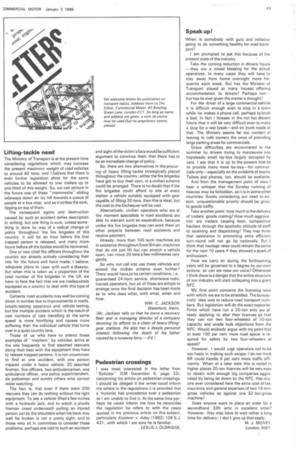Lifting-tackle need
Page 45

If you've noticed an error in this article please click here to report it so we can fix it.
The Ministry of Transport is at the present time considering regulations which may increase the present maximum weight of road vehicles to around 40 tons, and I believe that there is even further legislation afoot for the same vehicles to be allowed to tow trailers up to one-third of this weight. So, we can picture in the future one of these "mammoths" sliding sideways down an icy hill towards a queue of people at a bus stop, and as it strikes the kerb, tipping on top of them.
The consequent agony and destruction caused by such an accident defies description in writing, but one thing is sure, unless something is done by way of a radical change of policy throughout the fire brigades of this country, it will be an hour before the first trapped person is released, and many more hours before all the bodies would be recovered.
One or two chief fire officers throughout the country are already actively considering their role for the future and have made, I believe, adequate plans to cope vyith such a disaster, but when this is taken as a proportion of the total number of fire brigades in the UK we have to face the fact that we are inadequately equipped as a country to deal with this type of accident.
Certainly road accidents may well be corning down in number due to improvements in roads, breath-testing apparatus and vehicle testing, but the multiple accident which is the result of vast numbers of cars travelling at the same speed is more horrifying and causes more suffering than the individual vehicle that turns over in a quiet country lane.
Those of us who have to attend these examples of "mayhem" by vehicles, arrive at the site frequently to find assorted rescuers doing their best with the equipment they have to release trapped persons. It is riot uncommon to find at one accident, with one person trapped under a heavy vehicle, 20 assorted firemen, five officers, two a mbulancemen, one ambulance officer, one police superintendent, six policemen and sundry others who cannot resist watching.
The fact is. that even if there were 200 rescuers they can do nothing without the right equipment. To see a vehicle lifted a few inches with a hydraulic jack, and to watch a plucky fireman crawl underneath pulling an injured person out by the shoulders when his back may well be broken is not a pretty sight, and to those who sit in committee to consider these problems, perhaps one visit to such an accident and sight of the victim's face would be sufficient argument to convince them that there has to be an immediate change of policy.
So, there are two alternatives in the procuring of heavy lifting-tackle strategically placed throughout the country: either the fire brigades have got to buy their own, or a civilian scheme could be arranged. There is no doubt that if the fire brigades could afford to site at every station a vehicle suitably equipped with gear capable of lifting 20 tons, then this is ideal, but the cost to the Exchequer will be vast.
Alternatively, civilian operators who are at the moment specialists in road accidents are able to warrant such an expenditure, because unlike the fire brigades they can work them on other projects between road accidents and receive payment.
Already, more than 100 such machines are in existence throughout Great Britain, machines that do not just lift but can Stretch a vehicle apart, can move 20 tons a few millimetres very gently.
So why not call into use these vehicles and extend the civilian schema even further ? There would haveeo be certain conditions, i.e., guaranteed 24-hour service, shortwave radio, trained operators, but all of these are simple to arrange once the final decision has been made as to who does what, with what, when and how.
WM. C. JACKSON Waterford, Herts. [Mr. Jackson tells us that he owns a recovery fleet and is managing director of a company devoting its efforts to a chain of heavy liftinggear stations, He also has a deeply personal interest following the death of his father caused by a runaway lorry.—Ed.]




























































































